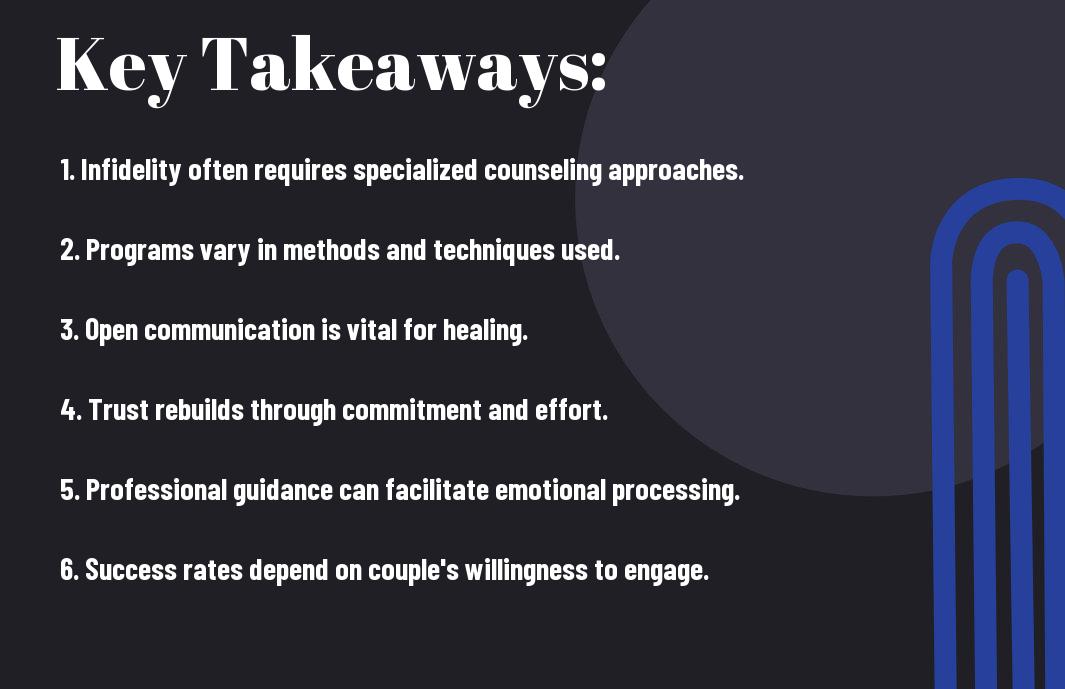Marriage can be profoundly challenging, especially in the wake of infidelity. If you find yourself grappling with betrayal, seeking professional guidance through marriage counseling can be a vital step in healing your relationship. This blog post reviews some of the top programs available, illustrating how they can support you in navigating the complex emotions and challenges that arise after an affair. Understanding the effectiveness of these programs can empower you to make a thoughtful decision about your path forward.

Key Takeaways:
- Marriage counseling can facilitate healing and communication after infidelity.
- Successful counseling often requires a commitment from both partners to work through the issues.
- Different counseling programs utilize various approaches; it’s imperative to find one that fits the couple’s needs.
- Involvement of an experienced therapist skilled in dealing with infidelity is beneficial.
- Counseling can help establish trust and rebuild the relationship, but it may take time and patience.
- Assessing the motivation and level of remorse from the unfaithful partner is vital for progress.
- Open and honest communication is a key component for effective resolution during therapy sessions.

Understanding Infidelity
While infidelity can have devastating effects on a relationship, it’s vital to understand the motivations and circumstances surrounding it to address the issue effectively. Infidelity often stems from unmet emotional needs, dissatisfaction in the relationship, or a quest for excitement. Understanding these reasons can guide couples through the healing process and help rebuild trust.
Types of Infidelity
Above are the various forms of infidelity that can occur in relationships:
| Emotional Infidelity | Engaging in feelings or romantic interests with someone outside the relationship. |
| Physical Infidelity | Having sexual relationships with someone other than your partner. |
| Cyber Infidelity | Using online platforms to engage with potential romantic interests. |
| One-Night Stands | Engaging in a brief sexual encounter with someone outside your relationship. |
| Inconsistent Behavior | Flirting or acting inappropriately without physical contact. |
Knowing the types of infidelity can provide insight into your relationship dynamics and aid in navigating the aftermath.
Impact on Relationships
An act of infidelity can create a ripple effect in your relationship, often leading to a breakdown in trust and communication. The emotional fallout can have serious repercussions not just for the individuals involved but also for the overall relationship.
Infidelity can strain your partnership, leading to feelings of betrayal, anger, and confusion. However, it also offers an opportunity to reassess your needs and desires in the relationship. Open and honest communication, along with a commitment to work through the pain, can transform this challenging experience into a moment of growth. You have the power to rebuild the foundation of your relationship or decide to part ways, making choices that suit your emotional well-being.
Marriage Counseling Overview
Clearly, marriage counseling is a therapeutic process designed to help couples navigate their relationship challenges, including issues arising from infidelity. By seeking counseling, you can work collaboratively with a trained professional to address underlying problems, improve communication, and explore the path toward rebuilding trust and unity.
Definition and Purpose
Beside acting as a safe space for couples, marriage counseling aims to facilitate open discussions, promote understanding, and foster healing. This process allows you to identify patterns that lead to conflicts, ultimately guiding you toward a more fulfilling relationship.
Common Approaches to Counseling
Around marriage counseling, several approaches exist, including cognitive-behavioral therapy, emotionally focused therapy, and the Gottman method. These methods offer various techniques tailored to help you and your partner effectively address your specific needs and relationship dynamics.
In fact, cognitive-behavioral therapy focuses on changing negative thought patterns, while emotionally focused therapy centers on creating emotional connections. The Gottman method emphasizes building a strong foundation of friendship and intimacy. Each approach has proven to be effective in addressing issues stemming from infidelity, helping you regain perspective and fostering the skills necessary for a healthier partnership. Moreover, selecting the right approach can significantly impact the effectiveness of your counseling experience.

Effectiveness of Counseling After Infidelity
Keep in mind that the effectiveness of counseling varies significantly based on individual circumstances. Many couples find that addressing the emotional wounds and rebuilding trust is possible through professional guidance. Counseling can provide a structured environment to facilitate open communication and healing, leading to potential reconciliation. However, success depends on both partners’ willingness to engage in the process and work towards a common goal.
Success Rates
An analysis of various studies reveals that approximately 60-70% of couples who undergo counseling after infidelity report an improvement in their relationship satisfaction. This statistic highlights that while the journey can be challenging, many partners find ways to rebuild their connections with effective support.
Factors Influencing Outcomes
Beside the counseling process itself, several key factors can significantly affect your outcome. These include:
- Willingness to forgive
- Level of commitment
- Quality of communication
- Duration of the relationship
Assume that understanding these factors enables you to approach counseling with clearer expectations and strategies for improvement.
Consequently, recognizing these influences can shape your approach to counseling. The willingness to forgive often dictates how quickly healing can begin, while a strong commitment to the relationship can propel both partners towards new goals. Maintaining open and honest communication fosters transparency, whereas the duration of your relationship can impact emotional investment levels. Assure that you are both prepared to navigate this multifaceted journey together.
Top Marriage Counseling Programs
Now that you’ve considered the option of marriage counseling post-infidelity, it’s vital to explore the best programs available. Different approaches can yield varying results, so understanding the specifics of these counseling options will help you make an informed decision for your relationship’s future.
Program A: Overview and Results
Program A focuses on rebuilding trust and communication after betrayal. It has a structured approach that promotes individual accountability and shared goals, ultimately leading to positive outcomes for couples. Many participants report a stronger understanding of their partner’s feelings and needs after completing this program.
Program B: Overview and Results
Marriage Program B utilizes a combination of workshops and one-on-one sessions to help couples navigate the complexities of infidelity. It emphasizes forgiveness and reconnection, which can help you understand and heal the emotional wounds that infidelity causes.
A key aspect of Program B is its focus on carefully facilitating emotional healing and restoring intimacy. This program has garnered positive feedback due to its interactive techniques that engage both partners in honest discussions about their feelings. Many couples have reported a significant reduction in conflict and an increase in mutual respect after completing this program. However, be cautious—if both partners are not fully committed to the process, outcomes may vary. Ultimately, a willingness to work together can lead to lasting change.
Choosing the Right Counseling Program
For those seeking healing after infidelity, selecting the right counseling program is vital. You can explore resources such as Infidelity guides provided by professional organizations to better understand your options and narrow down programs suited to your needs.
Key Considerations
Against choosing any counseling program without evaluating its approach. It’s important to consider the therapist’s expertise in handling infidelity, their techniques, and how they support both partners in rebuilding trust and communication.
Questions to Ask a Counselor
The right questions can help you determine if a counselor is a good fit. Prioritize inquiring about their experience, especially with couples facing the aftermath of infidelity. Ask about their methods for addressing sensitive issues and how they facilitate open communication. You should also discuss their views on individual vs. couples therapy and how they plan to encourage healing and growth for both partners.
A thorough evaluation involves asking about your counselor’s success rate with infidelity cases and their approach to rebuilding trust. Additionally, inquire about their strategies for managing emotions and guiding discussions, ensuring they foster a safe environment for recovery. This will help you gauge if they can effectively support your unique needs as a couple.
Personal Stories and Testimonials
Your journey through marriage counseling after infidelity can be enlightening and transformative. Many couples have shared their experiences, revealing how counseling helped them navigate through the emotional turmoil and rebuild their relationships. Reading these personal stories provides insight into the various challenges couples face and how they can ultimately find healing and understanding, allowing you to reflect on your own situation with hope and optimism.
Success Stories
Beside the heartbreak and challenges, numerous couples have reported remarkable successes following counseling. Through effective communication and guided sessions, many couples have been able to not only overcome infidelity but also strengthen their emotional bond. Their testimonies highlight strategies that foster new trust and intimacy, providing a hopeful narrative for anyone in a similar situation.
Lessons Learned
With every story of survival, valuable lessons emerge that can guide your own healing process. Couples often emphasize the importance of open communication, trust-building activities, and commitment to change in overcoming the hurt of infidelity.
Due to the nature of infidelity, couples frequently find themselves learning profound lessons about vulnerability and forgiveness. Many express the significance of addressing underlying issues that may have contributed to the betrayal, thus fostering a deeper understanding of each other’s needs. As you navigate through counseling, these shared experiences serve as reminders that restoration is possible, and a renewed sense of trust can emerge when both partners are willing to invest time and effort into their relationship. Embracing such lessons can pave the way toward a more resilient partnership.
FAQ
Q: Can marriage counseling really help couples after infidelity?
A: Yes, marriage counseling can be effective for couples who are dealing with infidelity. It provides a safe space for both partners to express their feelings, understand each other’s perspectives, and work toward rebuilding trust. Skilled counselors use various techniques to address the underlying issues that led to infidelity, helping couples navigate the complex emotions involved in the healing process.
Q: How long does marriage counseling typically last after infidelity?
A: The duration of marriage counseling after infidelity varies depending on the couple’s unique situation and willingness to engage in the process. On average, couples may attend sessions for several months to a year. Some may find resolution sooner, while others might need more extended support to address deeper-rooted issues and fully heal.
Q: What should couples look for in a marriage counselor after infidelity?
A: Couples seeking a marriage counselor after infidelity should look for a professional who specializes in relationship issues and has experience dealing with cases of betrayal. It is important to find someone who is empathetic, non-judgmental, and supportive, as they will help create an open environment for communication. Additionally, considering the counselor’s approach to resolving conflicts and their success rates can be beneficial in making an informed decision.
Q: Will marriage counseling guarantee that a relationship can survive infidelity?
A: While marriage counseling can significantly increase the chances of rebuilding a relationship after infidelity, it does not guarantee that a couple will stay together. Success depends on various factors including the commitment of both partners to change, their willingness to engage in difficult conversations, and the ability to rebuild trust. Each couple’s journey is unique, and counseling provides tools to facilitate healing and decision-making.
Q: Are there specific programs that are recommended for marriage counseling after infidelity?
A: Yes, there are several programs specifically designed to help couples recover from infidelity. These programs often incorporate cognitive behavioral therapy, communication skills development, and trust rebuilding exercises. Some popular programs include workshops, online courses, and specialized retreats tailored for couples dealing with betrayal. Researching and reading reviews about these programs can assist couples in selecting the right one for their needs.
